Are you tired of guessing games with your network connections? Coaxial Cable Testers/Tracers are the solution.
Here are NerdTechy’s top picks:
- Klein Tools Coax Tester Tracer Mapper with Remote Kit
- Jonard CM-8 Coax Cable Mapper
- Southwire Tools & Equipment M500CX4 Coax Continuity Tester/Mapper
These devices offer a hassle-free way to locate, identify, and troubleshoot coaxial cable connections.
They’re indispensable for ensuring the integrity and performance of your cable network, be it for TV, internet, or other digital services.
Klein Tools Coax Tester Tracer Mapper with Remote Kit
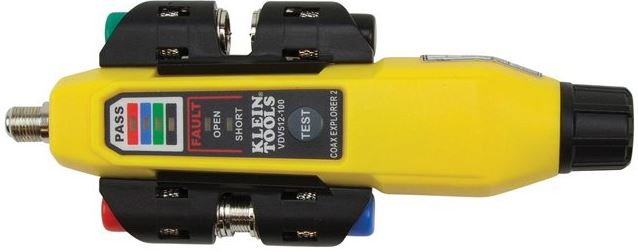
The Klein Tools Coax Kit was made rather specifically to help verify the continuity of an F-connector coaxial connection, and then help you to map out their location.
Whether you’re doing routine maintenance of a network or you’re trying to diagnose a problem in the line, that’s a very useful design.
In order to help make the multi-testing process a little easier, the Klein Tools Tester makes use of a color coded design for each testing remote. Keeping things simple, this tester uses one button operation. You literally just connect the cable you want to test, press a button, and you’re done. Pretty hard to mess up.
Design & Construction
Similar to many Klein Tools instruments, this tester was built with a bright yellow chassis. Maybe it won’t be winning any beauty contests, but it’s certainly easy to spot among other instruments. The tester measures 5.75 x 2.38 x 1 inches, making it reasonably compact, and mostly handheld in nature.
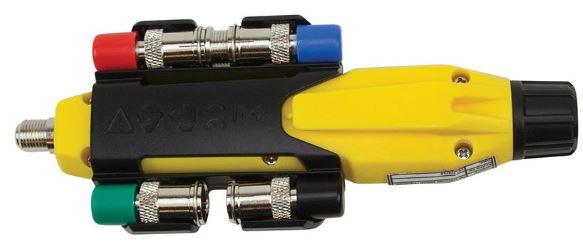
The chassis is primarily made from ABS plastic, which helps the instrument be at least partially impact resistant. The relatively lightweight nature of this instrument ensures if you did drop it, the damage would probably be superficial. Light scratching and nothing more.
For actually using the Klein Tools Coax Tester Tracer, you’ll find the test remotes as well as the F-adapter can be snapped onto the remote. That’s with the use of a clip on the tester itself, which makes for both easy storage and easy access when it’s time to use those remotes.
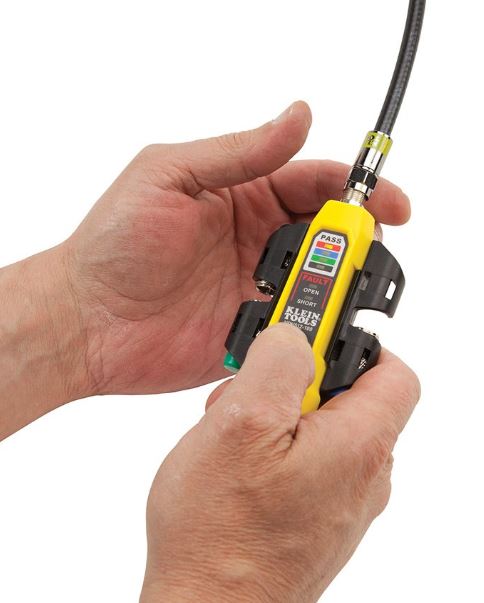
The front side has a very readable LED panel. It indicates whether the trace is set to pass, open, or short conditions for the cable that you’re measuring.
The color coded push-on design allows for four cables to be tested and organized with minimal effort and minimal chances of confusion. One end is red, the other blue, green, and black.
Other Considerations
This instrument is powered with the help of two alkaline AAA batteries, which are included. However, the included batteries aren’t very strong, you’ll want to replace as quickly as you can.
Once you’ve got a reliable pair of batteries inside, you can anticipate months’ worth of uninterrupted testing before you need to think about replacement.
Jonard CM-8 Coax Cable Mapper
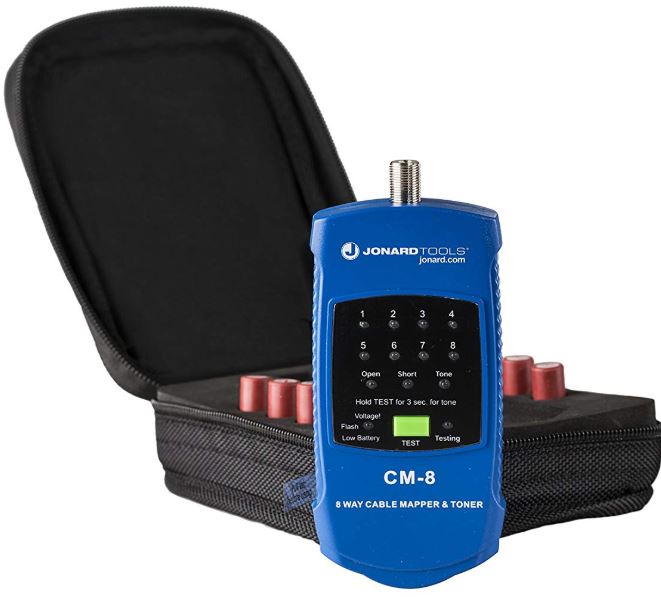
Extending its support much further than the Klein Tools instrument, the Jonard CM-8 is an eight-way cable mapping system.
It’s capable of running maps for several coaxial cable systems from one central point, making it ideal for a variety of different coaxial cable installations. That might include installations for satellite TV, closed circuit TVs, alarm systems, and so forth.
But more than simply handling more over greater distances, this tester can handle higher resistance cabling, too. That includes the ability to look for shorts on cables out for 4000 feet, on lines with a resistance of up to 100 ohms.
Hard to imagine needing a more powerful instrument than this, unless you’re involved in some kind of industrial cable configuration.
Design & Construction
The CM-8 measures 2 x 1 x 2.8 inches, and weighs just shy of one pound. The blue chassis isn’t especially attractive, but it’s just as sturdy and protective as the instrument from Klein Tools.
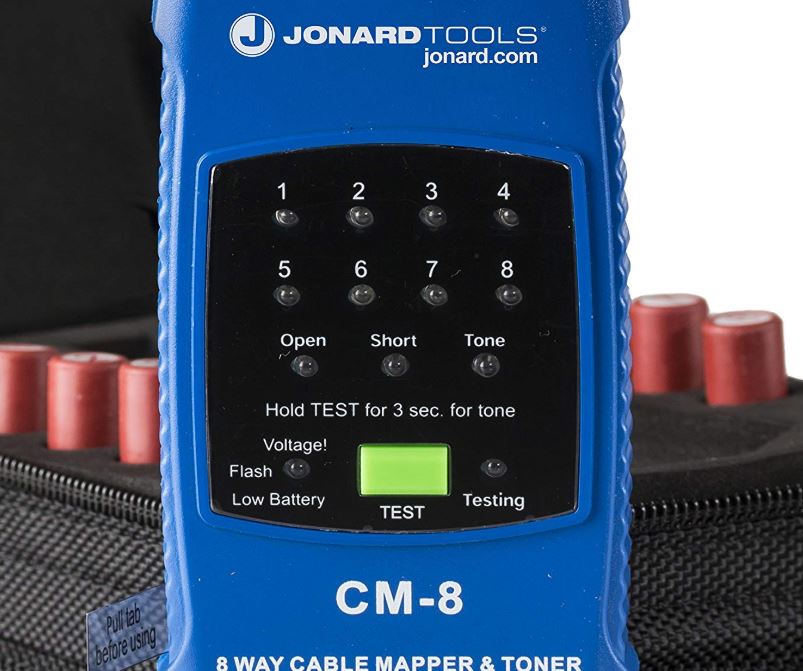
That’s because it’s made of essentially the same stuff, and built to essentially the same physical standards. Though there’s still no lanyard strap or carrying cable, once again, the device is lightweight and sturdy enough that occasionally dropping it shouldn’t be a grave concern.
The interface is mostly made up of a number of LEDs, which allow the user to help determine if there’s an issue along the wire that you’re testing.
As with the Klein Tools instrument, one-button operation makes this a pretty fool proof design. If you’re feeling a bit impatient, you’ll appreciate there’s a testing button to let you know the CM-8 is working. That way you don’t end up interrupting the instrument while it’s testing.

The CM-8 is powered with the aid of two CR2 batteries, which are included. The included batteries seem pretty robust, so you won’t have to place them straightaway.
And you ought to be able to get multiple months of regular use from the CM-8 before you have to start thinking about needing to replace the battery. There’s a low battery button to let you know when that time is coming.
It may also be worth noting that CR2 batteries are pretty easy to replace, almost as easy to find as AA batteries, and relatively inexpensive.
Other Considerations
The tone generator can help support better cable tracing, though no probe is included. This kit includes eight cable identifiers, a pair of alligator clips, a Cordura carrying case, and a user manual.
The carrying case is made of a rigid waterproof nylon, complete with a zipper to help keep everything secure and safe inside the case.
Southwire Tools & Equipment M500CX4 Coax Continuity Tester/Mapper
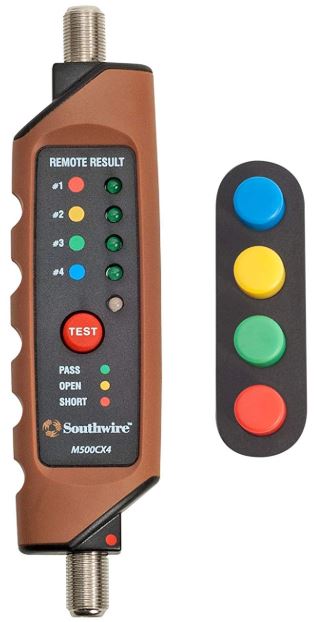
Sometimes you don’t need a coax cable that can do everything. Sometimes you just need a simple tester that helps you do your job.
The Southwire M500CX4 was designed to try and be that tester. The interface makes use of an easy to understand LED display, which makes this instrument very approachable.
Even though it’s wonderfully approachable, it’s also able to provide a wide compatible for testing installed cables or testing patch cables. It can identify four coax cable remote locations, and includes four color-coded IR remotes, allowing it to perform every bit as well as the Klein Tools tester.
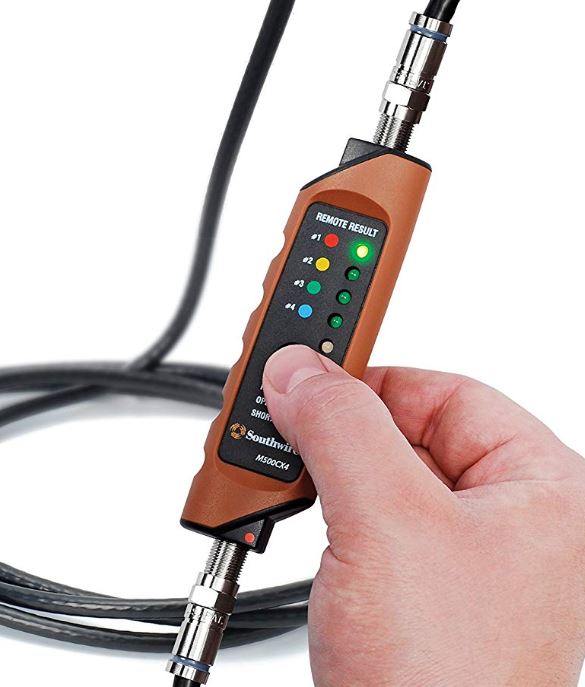
Design & Construction
The M500CX4 measures 5.5 x 1.25 x 0.5 inches, and weighs only a few ounces. It’s powered by four LR44 batteries, which are included.
The unit was constructed with a double molded housing which serves to bolster both its durability and the user’s grip. Though again, ruggedness isn’t the highest priority for an instrument like this, it’s fair to say the M500CX4 is quite solid.
Similar to the CM-8, you’re looking at a one button design that is pretty hard to mess up. But the interface is actually considerably more approachable and friendly than the CM-8.
The device is pretty much made to where a total novice could start using it without having to so much as read the user manual.
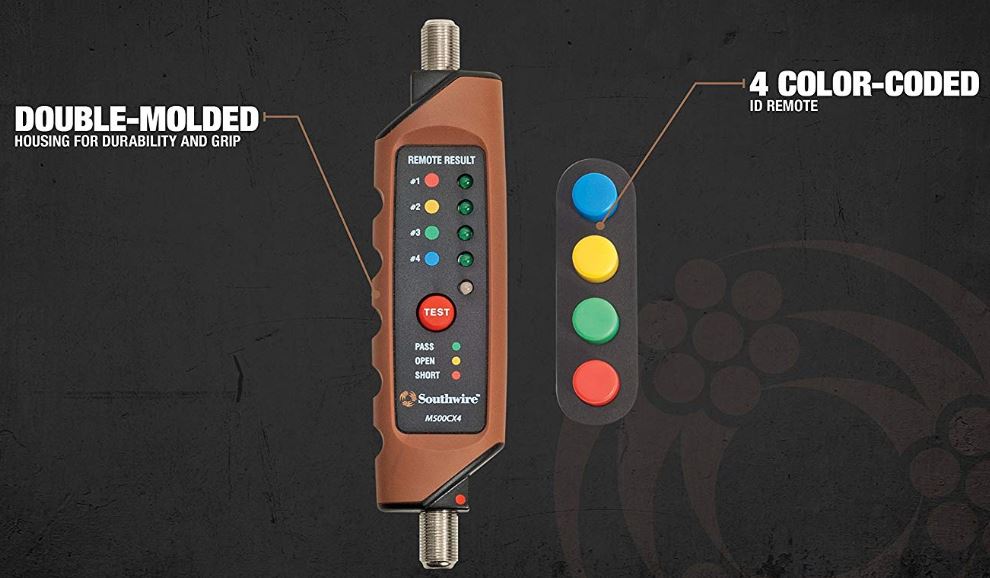
Other Considerations
There’s not much in the way of extras of special features included with the MC500CX4. That’s probably a good thing because it’s reflected in the price.
But there are some common sense features that are still included. For instance, you’ll find this instrument will automatically shut itself off when you’re not using the device.
Which One Should You Choose?
The Klein Tools Coax Tester Tracer Mapper with Remote Kit isn’t the right choice for someone who’s trying to test high-resistance lines, or someone who’s trying to test cables that run extremely long distances.
But for most residential circumstances, this kit is going to perform marvelously. It’s simple, intuitive, and it gives you all the tools you need to get the job done. If you’re looking for a cheaper instrument for primarily residential use, you’ll probably want to try the Klein Tools tester.
The Jonard CM-8 Coax Cable Mapper was made to handle lengthier cables, and it was made to handle cables putting out more resistance.
The instrument itself is still reasonably intuitive and easy to use, but the hardware is simply able to take on more challenging tasks than instruments like the Klein Tools Coax Tester. Which makes the CM-8 a good choice for someone testing high resistance lines running 100 ohms.
Last but not least, the Southwire Tools & Equipment M500CX4 Coax Continuity Tester/Mapper is similar ot the Klein Tools Coax Tester. It’s not able to take on enormously lengthy cables, or cables with incredibly high resistance, like the CM-8.
But it’s even bit as intuitive, and it’s designed to accommodate slightly more throughput than the Klein Tools’ instrument. For someone who’s going to be using their coaxial cable tester tracer for more than the occasional measurement, the M500CX4 might be worth grabbing.
Meet Ry, “TechGuru,” a 36-year-old technology enthusiast with a deep passion for tech innovations. With extensive experience, he specializes in gaming hardware and software, and has expertise in gadgets, custom PCs, and audio.
Besides writing about tech and reviewing new products, he enjoys traveling, hiking, and photography. Committed to keeping up with the latest industry trends, he aims to guide readers in making informed tech decisions.

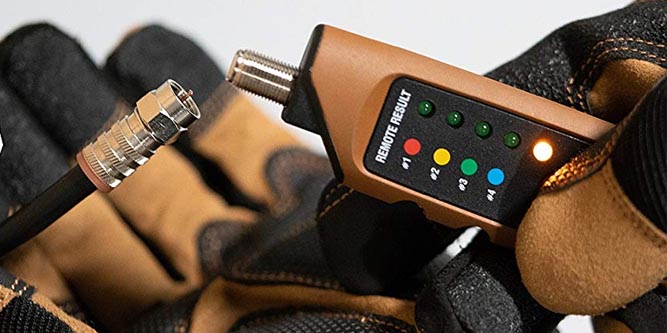
Is there a way to test a cable that’s in the ground with unknown beginning and end — just to see if it’s live and being used, or not? Thank you.